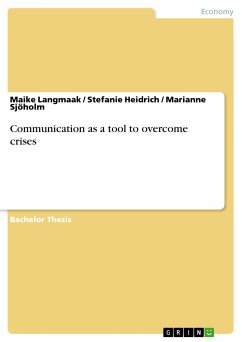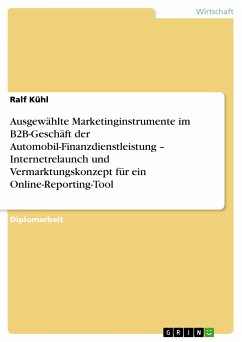Bachelor Thesis from the year 2004 in the subject Business economics - Offline Marketing and Online Marketing, grade: pass with destinction, Växjö University (School of Management and Economics), language: English, abstract: Due to the fact that many companies have to deal with one or more crises, crisis management has become a buzzword in today.s hyper-competitive business environment. The successful management of crises is strongly influenced by the performance of a company.s internal as well as external communication. This thesis investigates how communication serves as a tool for an organisation to overcome a crisis successfully. In order to answer this question we undertook broad theoretical research as well as deep empirical investigations. Before starting our research, we carried out a methodological reflection. We chose to adopt the hermeneutic approach in order to base our study on the qualitative approach rather than a quantitative one. We think this is more appropriate for our thesis because crisis management and communication cannot be sufficiently measured in statistical terms. Furthermore we used theories to increase our understanding but we did not test them in our empirical part. Thus, we describe our work as inductive as our empirical study is based on our research question, which we generated from our theoretical pre-understanding. We started by scanning the theoretical work that has already been done in the field of crisis management. We chose to examine all stages of a crisis situation: before, during, and after. Furthermore we combined these stages to the crisis communications process. All stages involve several steps, which should be considered by an organisation in order to overcome a crisis successfully. Before a crisis occurs a company has to get prepared by setting a crisis management team, identifying and assessing possible risks, developing a crisis communications plan, and recognising signs which indicate the appearance of a crisis. During a crisis an organisation has to deal with the point-of-no-return and to activate its crisis communications plan in order to respond to the crisis. Once a crisis is over the company has to start to evaluate its performance with the aim of learning from the occurrence and of improving the preparedness for possible future crises. The next step when writing this thesis was to find a company, which experienced a crisis situation in order to analyse its performance throughout the crisis. We have chosen Baxter, an international medical health-care company, which has been stroke by a crisis in the year 2001. [...]
Dieser Download kann aus rechtlichen Gründen nur mit Rechnungsadresse in A, B, BG, CY, CZ, D, DK, EW, E, FIN, F, GR, HR, H, IRL, I, LT, L, LR, M, NL, PL, P, R, S, SLO, SK ausgeliefert werden.









